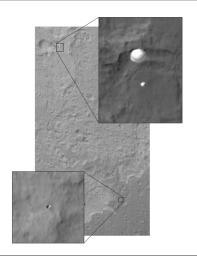
|
Curiosity Sails to Mars as Heat Shield Falls Away
- Click the image above for a larger view
- Full-Res JPEG (931 x 1213) (103.8 kB)
- Full-Res TIFF (931 x 1213) (1.1 MB)
Caption:
Late last night, in the morning hours of Aug. 6, as NASA's Curiosity rover fell to the surface of Mars, NASA's Mars Reconnaissance Orbiter (MRO) captured an image of the rover gliding on its parachute. The image was taken with the orbiter's High-Resolution Imaging Science Experiment (HiRISE) camera.
Today, the MRO team located another object in this image -- not present in prior images of the same region -- which is the right size to be the rover's heat shield. The heat shield was ejected from the rover and its back shell before this image was taken. The team thinks the heat shield is still in free flight, because, if it were to have already hit the surface, it would have kicked up a dust cloud. The HiRISE image of NASA's Phoenix lander on its parachute also captured the heat shield in free fall.
Other image products from the same observation are, or will be, at http://uahirise.org/releases/msl-descent.php .
Background Info:
HiRISE is one of six instruments on NASA's Mars Reconnaissance Orbiter. The University of Arizona, Tucson, operates the orbiter's HiRISE camera, which was built by Ball Aerospace & Technologies Corp., Boulder, Colo. NASA's Jet Propulsion Laboratory, a division of the California Institute of Technology in Pasadena, manages the Mars Reconnaissance Orbiter Project for NASA's Science Mission Directorate, Washington. Lockheed Martin Space Systems, Denver, built the spacecraft.
Cataloging Keywords:
| Name | Value | Additional Values |
|---|---|---|
| Target | Mars | |
| System | ||
| Target Type | Planet | |
| Mission | Mars Reconnaissance Orbiter (MRO) | Lunar Reconnaissance Orbiter (LRO), Mars Science Laboratory (MSL), Phoenix |
| Instrument Host | Mars Reconnaissance Orbiter | Curiosity Rover, Lunar Reconnaissance Orbiter, Phoenix Lander |
| Host Type | Orbiter | Rover, Lander |
| Instrument | High Resolution Imaging Science Experiment (HiRISE) | |
| Detector | ||
| Extra Keywords | Dust, Grayscale | |
| Acquisition Date | ||
| Release Date | 2012-08-07 | |
| Date in Caption | ||
| Image Credit | NASA/JPL-Caltech/Univ. of Arizona | |
| Source | photojournal.jpl.nasa.gov/catalog/PIA15993 | |
| Identifier | PIA15993 | |
